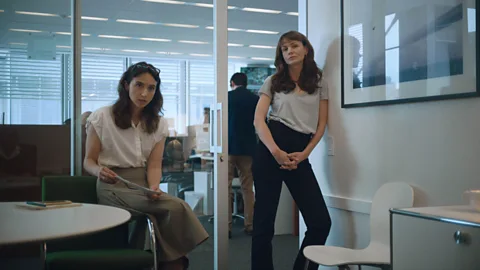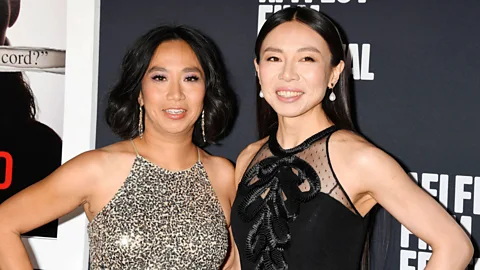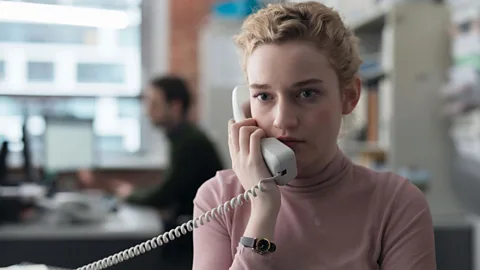Weinstein drama She Said and the films taking on abusive men
 Alamy
AlamyThe film about the original exposé of Harvey Weinstein is one of many recent works to address systemic male sexual violence – but how effective are they, asks Hanna Flint.
It’s been five years since the flames of the #MeToo reckoning were fanned by the New York Times exposé of disgraced movie mogul Harvey Weinstein for sexual assault, so it was inevitable that Hollywood would commit this story to its own cinematic record. She Said, directed by Maria Schrader and written by Rebecca Lenkiewicz, is a powerful adaptation of She Said: Breaking the Sexual Harassment Story That Helped Ignite a Movement, the 2019 book by Times journalists Jodi Kantor and Megan Twohey that recounts how they broke the explosive story, with Zoe Kazan and Carey Mulligan playing the intrepid reporters.
Since its premiere at the 60th New York Film Festival in October, the drama has been praised for its precise approach to journalistic storytelling, which is reminiscent of 2016 Oscar-winner Spotlight: rather than sensationalising the efforts of Kantor and Twohey or the testimonies of the survivors who spoke out against Weinstein, it provides the grounded, granular detail of what goes into such a difficult investigation, without undercutting the emotional ordeal for the women involved.
More like this:
– 10 of the best films to watch this November
Rowena Chiu was one of those "unfamous women trying to do their jobs who were abused by Harvey", as she alleged in her own New York Times op-ed. She was hired to assist the Miramax producer in London on his European productions, and says that Weinstein attempted to rape her at the Venice Film Festival only two months after starting the job – at which point her colleague Zelda Perkins confronted Weinstein. Chiu says she was eventually coerced by Weinstein into g a non-disclosure agreement in return for a £125,000 settlement.
 Alamy
AlamyChiu's traumatic experiences are depicted in the film – and as Chiu tells BBC Culture, she had to make a big decision about whether she wanted to feature in the movie before she had even gone public with her story; her allegations had appeared in the original reporting in 2017, but at that point, she had chosen to remain anonymous. Kantor and Twohey's book did end up naming her, but nine months before it was published, when she had not yet agreed to have her name published, she recalls attending "a very clandestine meeting", where she ed fellow Weinstein survivor Laura Madden and Perkins for a "surreal" conversation in a Hollywood office "to discuss the hypothetical movie" as well. "Because the article was already out, and had made such an impact on the world, publishers were excited in advance of Jodi and Megan's book, and film rights were almost sold before the book was written – that's rare, I think, to have things happen in that order."
Chiu was reticent about explicitly featuring in both the book and film in the first instance because of how her story might be portrayed. "Authors and journalists and podcast hosts, everyone else that would want to have a piece of it, are mediators who have their own agenda of selling books or selling papers, or reaching an audience," she says. "However benevolent and benign that motive might be, that is never going to quite align with the survivors' motivations. Often, survivor stories aren't particularly palatable for audiences, perhaps because they are too raw," she adds.
"They're difficult, they're confronting and because Hollywood creates fictional s of real-life events, it can be challenging for the survivor to see his or her real story be fictionalised in that way. The emotional impact is so powerful that audiences start to react to the fictionalised in a greater way than they do to your real-life ."
However when Chiu saw She Said at the London premiere, she recognised the real value of the film in the reaction of her best friend, who she had told in 1998 about her attack and attended with her. "Even though he knew all the events that had happened to me throughout the years, including my [subsequent] suicide attempts in Hong Kong – he was actually a person that I called [in the scene you see in the] the hotel room, where Ashley Chiu is portraying my suicidal self – I saw him cry at the movie and relate to it in an emotional way that he might not have when I was testifying to Parliament or going on BBC Newsnight," she says. "In that moment I felt proud that the movie is going to reach places in people's hearts that all the other s don't."
Different styles of interrogation
She Said is not the only narrative film in recent years to engage with the culture of systemic male abuse that has been exposed in the five years since the first Weinstein revelations. 2019's Bombshell (written and directed by two men: Charles Randolph and Jay Roach, respectively) takes a more buzzy approach to telling the story of the efforts made by a group of female Fox News journalists to expose the alleged toxic workplace behaviour and sexual harassment of Fox News head Roger Ailes (a story that broke before Weinstein). TV drama The Loudest Voice also dealt with Ailes's alleged misconduct, this time centring Russell Crowe as Ailes in the story over his victims. Meanwhile series as varied as The Morning Show, BoJack Horseman, Jane the Virgin and Grey’s Anatomy have interrogated systemic abuses and harassment towards women in the workplace, as perpetrated by powerful men, from a breakfast show host and a sitcom actor to a university professor and a doctor.
Then there was 2020's Promising Young Woman, which interrogated the behaviour of men as a group: the feature debut of Emerald Fennell, it starred Mulligan as an avenging angel giving payback to the male species for the rape and suicide of her best friend, and was a poppy yet darkly humorous comment on the normalised habits of so-called "nice guys" preying on drunk women. The film certainly sparked a conversation. Focus Features partnered with RAINN, the US's largest anti-sexual violence organisation, to stream the film in colleges and its worldwide release launched a thousand think-pieces on the various merits and mistakes in Fennell's take on rape culture, trauma and the societal propensity for protecting predators. Like Bombshell, it earned significant awards season notice and was nominated for best picture, best director, best actress (Mulligan), and best film editing at the 2021 Academy Awards, winning for best original screenplay.
 Alamy
AlamyThere is one film, however, that deserves more recognition than it ever officially received for its striking approach to the painful subject matter: Kitty Green's The Assistant, which showed a day in the life of Jane, the eponymous female employee of a Weinstein-like producer, played by Julia Garner. For Nikki Baughan, deputy reviews editor for Screen International, it was a film all the stronger because of its understatement. "It is so powerful because we never see this man, we only hear his voice through a door, on a phone, but we completely understand his hideous behaviour, and the insidious effect it has on those around him, by Jane's reactions.
"She gets physically smaller in the frame as the film goes on, increasingly quiet and downcast, isolated in this toxic environment in which she has zero autonomy," she adds. "It's a film that says so much about toxic masculinity, gender abuse and the trauma of speaking out, without ever feeling the need to soapbox or lecture. It makes you feel like you're walking in Jane's shoes."
Winnie M Li, film producer-turned-author, sexual assault survivor and activist, similarly praises The Assistant because she felt it "nailed" what other #MeToo films dealing with abuse in the the entertainment industry struggled with. "The thing with trying to represent #MeToo in the film industry is, like, how do you make it not too on the nose":[]}
